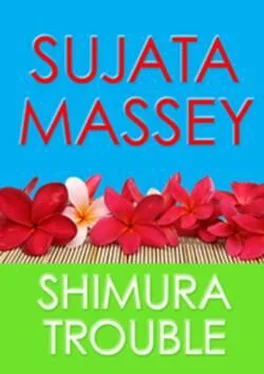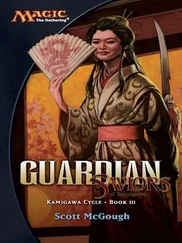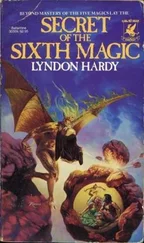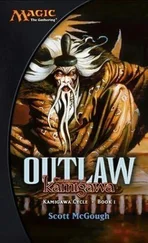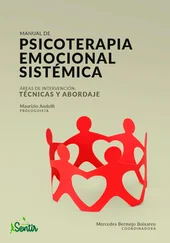Sujata Massey - Shimura Trouble
Здесь есть возможность читать онлайн «Sujata Massey - Shimura Trouble» весь текст электронной книги совершенно бесплатно (целиком полную версию без сокращений). В некоторых случаях можно слушать аудио, скачать через торрент в формате fb2 и присутствует краткое содержание. Жанр: Детектив, на английском языке. Описание произведения, (предисловие) а так же отзывы посетителей доступны на портале библиотеки ЛибКат.
- Название:Shimura Trouble
- Автор:
- Жанр:
- Год:неизвестен
- ISBN:нет данных
- Рейтинг книги:3 / 5. Голосов: 1
-
Избранное:Добавить в избранное
- Отзывы:
-
Ваша оценка:
- 60
- 1
- 2
- 3
- 4
- 5
Shimura Trouble: краткое содержание, описание и аннотация
Предлагаем к чтению аннотацию, описание, краткое содержание или предисловие (зависит от того, что написал сам автор книги «Shimura Trouble»). Если вы не нашли необходимую информацию о книге — напишите в комментариях, мы постараемся отыскать её.
Shimura Trouble — читать онлайн бесплатно полную книгу (весь текст) целиком
Ниже представлен текст книги, разбитый по страницам. Система сохранения места последней прочитанной страницы, позволяет с удобством читать онлайн бесплатно книгу «Shimura Trouble», без необходимости каждый раз заново искать на чём Вы остановились. Поставьте закладку, и сможете в любой момент перейти на страницу, на которой закончили чтение.
Интервал:
Закладка:
Even with the added weight of a dozen grocery bags, the minivan made it back to Kainani, where I prepared a large breakfast of scallion-and-tomato omelettes for everyone-two whites and no yolk for my father-plus toasted slices of a sweetish white bread. Tom performed surgery on a Maui pineapple, cutting its flesh into perfect triangles. I cut into the passion fruit I’d picked up on my run, and scooped its runny yellowish interior into a small bowl.
When I tasted the passion fruit, I almost swooned. It was sweet-sour, fragrant, and the perfect complement to the excellent pineapple, which was not just sweet but complex, with almost a hint of coconut flavor.
Once we all had food in our stomachs, the mood around the table improved. I found myself enjoying a conversation with my uncle and Tom about what was happening in Japan.
“Rei-chan, I think you’re ready to become a wife,” Uncle Hiroshi said, wiping his mouth with satisfaction on one of the decorative paper napkins I’d bought. “I wonder what kind of dinner Edwin’s wife will make for us?”
“Margaret?” I asked, resenting the easy sexism my uncle displayed. “Who knows if she’s the family cook? It could be Edwin, or maybe the children, Courtney and Braden, if they’re old enough.”
“They all have Western names,” Tom mused.
“That seems to be the pattern of most Japanese-Americans,” my father said. “It probably has something to do with not wanting to be noticeably foreign, after what happened during the Second World War.”
“Yes, we cannot expect them to be Japanese at all,” Uncle Hiroshi said. “It’s been a century, almost, since our great-great-aunt arrived. It’s only natural they are more American than Japanese.”
I THOUGHT ABOUT my uncle’s words that night as we drove the minivan into the neighborhood where Edwin and his family lived. I’d expected it to be a flashy neighborhood, but Honokai Hale turned out to be an older community, a hodge-podge of modest homes that seemed to have followed no architectural master plan such as I’d seen in the town of Kapolei. Chain link fences, monster trucks, and barking dogs greeted us as we parked on Laaloa Street in front of an asphalt-shingled two-story house with rusted air-conditioners fixed in the windows. But because of the height of the neighborhood, it offered a magnificent view of the Pacific Ocean in all its glory, punctuated only by the containers and buildings of the shipyard I’d noticed earlier.
“My goodness,” my father said, interrupting my contemplation. “Could that be Edwin’s father-our ojiisan Yoshitsune?”
Startled, I looked at an elderly man coming around the side of the house, dragging a hose. He wore knee-length rubber boots, dirty khaki pants and a white undershirt. With a complexion like keyaki wood, squint lines around the eyes, and a shock of white hair, he looked like an aged Japanese peasant.
My father bowed deeply and murmured a traditional Japanese greeting, but the man frowned as if puzzled, and asked in a heavy pidgin accent, “You the one from Yokohama?”
“No, I am he.” Uncle Hiroshi came forward, bowing, and introduced himself in very formal Japanese, not the usual way a banker would speak to an old man in a dirty undershirt and fisherman’s boots. Tom joined him, bowing and introducing himself.
Still the man wouldn’t give his name, so I decided to speak to him in English. “My name is Rei Shimura. May I ask if you are Mr. Yoshitsune Shimura?”
“Nobody talk that formal out here. You can call me Uncle Yosh,” the man said, looking me over rather critically. “You came for my birthday, yah?”
“Yes, we did,” Tom answered in English, as if he’d finally realized that was our great-uncle’s preferred language. “I’m Tsutomu, but please call me Tom. Like you, I prefer a nickname!”
“You all a little late.”
“Uncle Yosh, I’m sorry. I must not have driven quickly enough.” I glanced at my watch, which read five to six.
“I mean that I made eighty-eight last year! Why you not come then?”
“I’m sorry,” I said, shooting a significant look at my father. “I believe our families found each other a month ago.”
“Yes, Oji-sama, I regret we have come a year late to supper!” my father valiantly chimed in. “We feel so lucky to finally meet you and to learn about the life of your mother, who must have been a very brave, strong, character.”
“My kaa-san?” Yoshitsune asked. I almost didn’t understand him, because he was using the word for mother without the honorific ‘o’ in front that was customary in Japan.
“Your okaasan, Shimura Harue-sama,” my father answered politely, still in Japanese. “She apparently left our family when she was quite young. We are eager to learn about her.”
“Surprise to hear that. She didn’t choose to leave Japan.” Yoshitsune’s voice was cool, and as he evaluated us, I felt a rush of shame, followed by curiosity that got the better of me.
“We want to know why,” I said. “My father said he heard whisperings there had been a sister to his grandfather, but nothing more than that.”
“She didn’t want to get married to some old fool they picked for her husband,” Yosh said, grinning slightly. “So they said you don’t want to marry, you gotta leave the house. She was thinking that meant she’d find a job somewhere in Tokyo, but she had no clue about the real, hard world!”
“This is fascinating,” my father said. “What happened next?”
“Your great-grandpa bought her a one-way ticket to Honolulu and also some false papers saying that she had relatives sponsoring her. She told me she thought it was going to be a great adventure. She only got scared once she was on the boat, when the other passengers, all of them rough, poor people from the countryside, insisted she would have to be married for anyone to hire her or give her housing. And that’s how she came to meet and marry my fadduh, a few days after she arrived…”
“Good, you found us!” Edwin said as he opened the front door and broke into the story. “But, Dad, look at yourself! I told you to get dressed hours ago; this is your birthday party!”
Yoshitsune waggled the hose at him. “The koi need something to swim in. I gotta fill the pool again, there must be a leak.”
“Do you keep koi?” I asked, looking around the garden. Then I saw it, a small ornamental fishpond occupying pride of place in the center of a dry-grass yard. I followed Yoshitsune over to the pond and stayed, looking at the fish, as he stuck the hose in the pool, then ambled back over to the side of the house to turn on the water. I’d assumed only specially treated water went into these ponds, but the half-dozen long gold, orange and cream fish looked healthy. Whatever Uncle Yosh was doing, it worked.
“Come in, come in,” Edwin urged, and obediently, I followed everyone up a cracked cement path and left my sandals at the doorway. The shoes-off tradition was part of Japanese culture that had endured.
Inside, I was zealously hugged by Edwin, and then by a small, sun-browned woman with short black hair attractively streaked with silver.
“When we learned about you and your family, we were so excited.” Auntie Margaret spoke with a melodious lilt that so many people in Hawaii had, to some degree-perhaps vestiges of their grandparents’ home languages. “But you came by yourself! Where’s your husband?”
“I don’t know. I’m not married yet.” I smiled at her, thinking again that Hawaii wasn’t so different from Japan, if a thirty-year-old was automatically expected to be married.
“Oh, still not yet!” Margaret laughed. “We heard about your big-shot lawyer fiancé. He won a class action suit, yah?”
Now I flushed red and understand who the ‘son’ was that Edwin had referred to in his letter to my father. “It’s true that Hugh Glendenning did work with many other lawyers on a class action suit representing comfort women and forced laborers who suffered during World War Two. We’re really not in contact with each other anymore, though.”
Читать дальшеИнтервал:
Закладка:
Похожие книги на «Shimura Trouble»
Представляем Вашему вниманию похожие книги на «Shimura Trouble» списком для выбора. Мы отобрали схожую по названию и смыслу литературу в надежде предоставить читателям больше вариантов отыскать новые, интересные, ещё непрочитанные произведения.
Обсуждение, отзывы о книге «Shimura Trouble» и просто собственные мнения читателей. Оставьте ваши комментарии, напишите, что Вы думаете о произведении, его смысле или главных героях. Укажите что конкретно понравилось, а что нет, и почему Вы так считаете.
